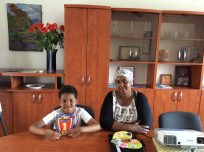Providing safe shelter, community and hope: how collective sites support displaced families in Ukraine
In the face of Russia’s full-scale invasion, more than 74,000 internally displaced people in Ukraine continue to reside in collective sites. These sites, established primarily by the authorities in schools, dormitories, sanatoriums, and other public buildings across the country, provide temporary accommodation to those forced to flee their homes who have no other shelter options or means to rent an apartment or house, especially as costs of living have increased due to the war.
UNHCR supports 350 collective sites and their residents across Ukraine in different ways, including through refurbishments and small repairs, provision of necessary utilities, also ensuring residents’ access to information and legal aid, and organizing social activities and livelihood training.

© UNHCR/Oleksii Barkov
Kateryna, 64, fled from Bakhmut in Donetsk region to Lubny in Poltava region, in May 2022. She fled together with her husband, who struggled with deteriorating health due to diabetes and needed to be close to a hospital. After arriving in Poltava, the city council provided accommodation for the couple in the Lubny Forestry Technical College.
“At the beginning, it was very scary to live at the dormitory. But then we started to receive assistance, washing machines, refrigerators, and other much-needed appliances, which improved our living conditions drastically. I’m very grateful to God that he sent us to this place where people are not indifferent to our life and our grief,” says Kateryna.
Support to collective sites remains a key priority for UNHCR, as these sites provide a safe space for the most vulnerable among the forcibly displaced, including older people, people with disabilities, large families, and people with very low incomes.
With the intensified hostilities in Donetsk, Kharkiv and Sumy regions, collective sites are also providing shelter to some of the thousands of people who since August 2024 have been evacuated or fled themselves from frontline communities.

© UNHCR/Tetiana Kuras
Yevhen together with his wife Olena and their three children – Oleksiy, 7, and twins Alisa and Anastasia, 7 months – were mandatorily evacuated from Myrnohrad in the Donetsk region after a rocket attack damaged their home. Forced to leave everything behind, the family now lives in a collective site in Reshetylivka, Poltava region.
“I had the same thoughts as everyone else. Where should we go? No one is waiting for us there. What to live on? How to find a job? There’s nothing. But when the war came very close, the shelling was on our street and the windows cracked, it became clear we had to go,” says Yevhen Lupanchuk.
“We’ve been here for three weeks now, it’s so calm, nothing explodes and everything we need is available. The conditions are very good. We were also registered for cash assistance immediately and have already received money on my card. So far, everything is fine, but we’ll see how it goes,” adds Yevhen.
UNHCR has invested close to $880,000 in a comprehensive renovation and upgrade of this collective site in the town of Reshetylivka, transforming it into a safer, more accessible and comfortable living environment for large families like Yevhen’s. New floors, windows, heating systems, and bathroom facilities have been installed, along with an elevator for people with disabilities or low mobility. These improvements ensure that residents can live with dignity while they seek to recover from the traumatic experiences of war and having fled from their homes and communities. The site can accommodate up to 150 people and currently hosts 128 recent evacuees from Donetsk and Sumy regions.
While collective sites offer critical support by providing shelter and basic services – helping people heal from the trauma of displacement – they are meant to be a temporary solution while more appropriate longer-term housing options are identified. However, some internally displaced people have already lived in collective sites for more than two and a half years.

© UNHCR/Oleksii Barkov
Anzhelika, 51, a widow from Zalyman village in Kharkiv region, endured two months of Russian occupation of her village, before she fled and found safety at the collective site in Lypkuvativka, Kharkiv region in March 2022. Despite the hardship, Anzhelika managed to find a job as a caretaker at the collective site and is now saving up to be able to move to her own place in the future.
“I dream of my own house,” she says. “To work with the land, to plant strawberries, cucumbers, tomatoes, to have cattle so that children and grandchildren would come to visit me. I want to achieve something, to always go forward so that my grandchildren are proud of me. I am not giving up; I believe that everything will be good.”
While supporting the urgent needs of people living in collective sites, UNHCR simultaneously works to help them find more durable solutions. Residents of collective sites are informed about services available out of the sites, such as information on employment, livelihoods, and training and reskilling opportunities.
UNHCR also helps find alternative and more durable housing solutions for displaced people, enabling them to move out of collective sites. Through its “Rental Market Initiative”, launched in 2023 and implemented across eight regions in central and western Ukraine, UNHCR provides protection counselling and legal advice, helps displaced people conclude rental agreements, and provides cash assistance to cover several months of rent and utilities. So far, via this programme, UNHCR has helped over 2,000 families in Ukraine find private housing solutions and facilitated their access to job opportunities, building self-reliance amongst displaced families.
UNHCR also supports the “Prykhystok” (Shelter) programme by providing financial assistance to host families who shelter internally displaced people across Ukraine. In 2024, UNHCR is disbursing financial support to more than 82,000as part of the Prykhystok programme managed by the Ministry of Reintegration of the Temporarily Occupied Territories of Ukraine.
UNHCR’s support to forcibly displaced and war-affected people in Ukraine, including the most vulnerable accommodated in collective centres, is made possible thanks to the generous funding received from steadfast donors like the European Union.
Page 4 of 4
-

Coming back home
21 Oct 2019 -

27 years away from home
9 Oct 2019It took Maksime 27 years to become a citizen of Ukraine. His talents and ambitions led him to find safety, a family, and a true calling.
-

Millions in eastern Ukraine endure invisible wounds of war
4 Oct 2019After five years of conflict, aid agencies are striving to meet the mental health needs of those affected.
-

A House Alive with Hope
29 May 2019After shelling in 2014, the roof of Liudmyla’s house was damaged by shrapnel., one corner of the house was virtually destroyed and a wall of the house was on the verge of collapse.
-

“When the shelling stopped, we had nowhere to go”
6 May 2019House of Ihnatenko family in Stanytsia Luhanska was completely destroyed by shelling and later reconstructed by NRC with funding provided by the UNHCR. Overall, 692 buildings were reconstructed by the UNHCR in 2018.
-

UNHCR self-reliance grants open doors for refugees and asylum seekers
24 Apr 201973 refugees and asylum-seekers received a small self-reliance grant from UNHCR, the UN Refugee Agency, in 2018, and got a chance to learn a new profession, earn a living and contribute to the society.
-

Odette Nienge: A story of a beautiful dream
8 Mar 2019Through her drive, Odette fulfilled her dream, through her work, she has found her husband, and through her life, she hopes to become an inspiration for many women.
-

Ruhullah Ramaki: Refugee from Afghanistan who became a doctor in Ukraine
14 Feb 2019Ruhullah is happy that he can give back to the country that gave him a second chance
-

“Ukraine gave me hope”
14 Aug 2018How UNHCR and NGO “NEEKA” is supporting refugees find jobs, and live their dreams!
